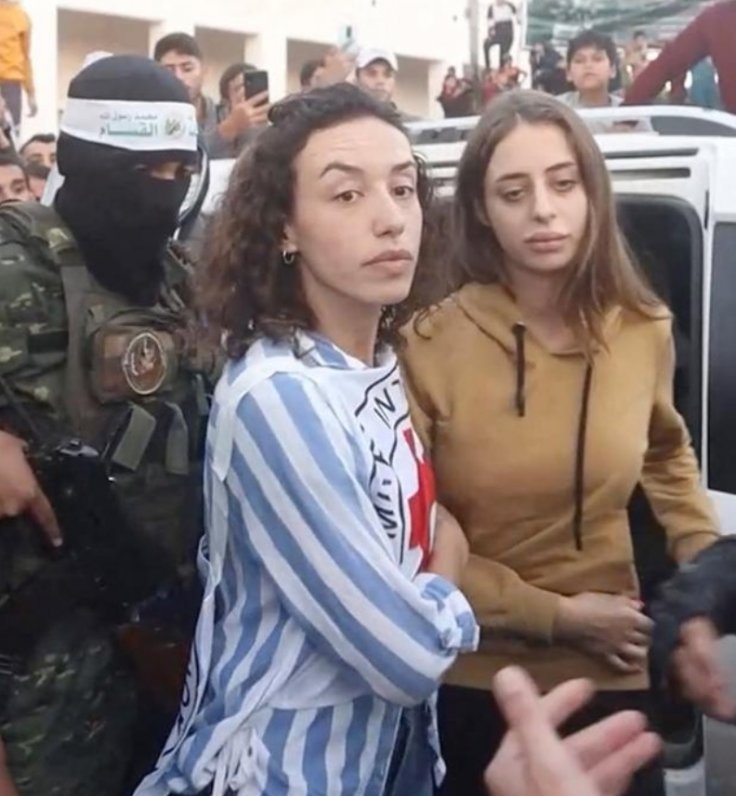Israeli hostages who were released by Hamas were allegedly given tranquilizers and extra food while in captivity to appear calm and happy for the cameras, Israel claimed on Tuesday. The hostages were initially starving but were given extra food right before their release and were even drugged by the terrorists.
An Israeli Health Ministry official told a Knesset Health Committee that the 110 civilian hostages who were exchanged for Palestinian terror suspects last week were reportedly provided with the Israeli brand of Klonopin "to improve their mood" so that they look happy and stay calm during the time of the handover to the Red Cross, the Times of Israel reported.
Drugged before Release

The benzodiazepine-class sedative and muscle relaxant, Klonopin, has the potential to induce a euphoric feeling. This could potentially explain why at least one hostage gained attention for displaying a perceived "look of love" toward a Hamas fighter after their release.
"This is part of the psychological terror Hamas put [the hostages] through," said lawmaker Moshe Saada.

Besides, health officials have mentioned finding evidence of "war crimes" on the bodies of some of the freed prisoners who were captured in a deadly October 7 raid, resulting in the deaths of more than 1,200 Israelis.
"A pill like this, for someone who is not used to its influence, works quickly to give you a feeling that you're high when their mental state was actually very low," Saada said.
Shir Siegal, the daughter of freed US citizen Aviva Siegal, described the stark contrast between the apparent blissful, drug-induced state of the captives and the harsh reality of their imprisonment.
🚨🇮🇱 The ISRAELI hostages are DAPPING UP HAMAS!
— S p r i n t e r (@sprinter000000) November 30, 2023
LMFAO!#IsraelAttack #IsraelTerorrist #PalestineGenocide #غزة_تستغيث pic.twitter.com/Qqq6EVPnrx
She mentioned that during their captivity, Hamas fighters allegedly handcuffed and tortured them, withholding necessary medical treatment.
"There are stories that they were treated OK, they were given food. [Hamas] didn't give them food, they didn't give them water," said Siegal, whose father, Keith Siegal, is among those still being held.

"As we're speaking, a holocaust is taking place three hours from here," she said. "[Aviva] told me last night, 'How can I function when I know exactly what is happening there [in Gaza] and my husband is still there?' So tell me, what am I supposed to say to my mother?"
Hostages Left to Starve
The hostages reported receiving sporadic meals during their captivity, with one claiming that their diet primarily comprised rice and pita bread. The Health Ministry told lawmakers that some of the released hostages had suffered a loss of up to 20% percent of their body weight and were found to be in a state of malnourishment, as reported by the newspaper.

Many of the hostages reportedly faced severe Vitamin D deficiencies due to limited sunlight exposure during their seven weeks of confinement and also suffered digestive issues. However, Nutrition Department director Ronit Endevelt mentioned that the hostages were provided with extra food just before their release to give the appearance of improved health.
Each released hostage has reportedly been assigned a nurse and social worker to facilitate both their physical and mental recovery, the article said.
vCan you imagine how they (H) treats hostages during detention to get reaction like this?
— Tiger Oyen (@SaniSohaimi) November 30, 2023
SHAME TO THOSE WHO SAID 👇🼠#iloveisrael or #istandwithisrael #israel #telaviv #israeli #jewish #BenjaminNetanyahu #IDFArmy pic.twitter.com/GgOgZeMJhI
However, there are still 119 men and 17 women and children remaining in captivity, according to Israel.









